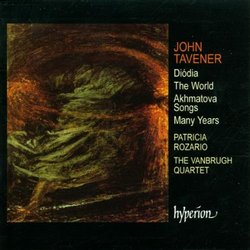Eclectic, but good mix of stuff
Moses Alexander | Alabama, USA | 06/02/2001
(4 out of 5 stars)
"This disc takes four pieces you would be hard pressed to find performed anywhere, but not because they aren't quality pieces. I think the primary reason these pieces don't get played often is because of two things: 1) the odd combination of performers required (soprano & string quartet) 2) Chamber musicians are typically even MORE conservative than most orchestras (and that is really saying something) so this stuff probably doesn't get much attention from performers. The opening piece "The World" is a setting of a splendid poem by Kathleen Raine. The odd beginning of the piece, a few jarring pizzicato notes followed by soprano Patricia Rozario's piercing voice perfectly sets the tone of Raine's poem (a play on words with more than enough content to ponder and discuss.) As always, Tavener's writing for the cello is amazing, and there is some nice interplay with the viola as well...the violins serve mainly to support the voice. Its not a piece that jumps out and grabs you at first, but upon repeated listens, there is some cool stuff going on. Next is the only instrumental piece on the CD "Diodia." This is actually my favorite of all the pieces on the CD. I think the piece works well as "music for music's sake" (which Tavener would probably roll his eyes at my saying) but it takes on a much deeper meaning when one knows something of the history behind the piece. It is about what happens to the soul after death. It is a piece with interchanges between serene beauty and bizarre, quirky passages that are intense. Taken on a deeper level the piece becomes conceptually interesting as well. The serene parts are to represent peace in the afterlife, whereas the more flashy or quirky parts are to represent worldly diversions, passions, etc. Most people will probably find those bits the most interesting while finding the serenity less appealing. I think if one really examines it, it is a deep statement on how humans view the world. We are more interested in our passions and worldly diversions than we are spiritual serenity and peace. When one calms one's senses though, they realize the beauty of the serene passages is far above the "interesting" worldly diversions. If one contemplates all the variables, it is quite a profound statement on the soul. Tavener described the piece as "liquid metaphysics" and I think that's a pretty good description.Next comes "Many Years," a piece written for Prince Charles' 50th birthday. The piece is sweet I guess you could say. I much prefer the way "Many Years" is sung in the Orthodox parish though. Here it takes on a slower more quietly joyous nature, wheras in parish life it is usually sung with vigor and a more celebratory feeling. (It is not only sung on birthdays though, also on namedays, marriage anniversarys, baptisms, etc...basically on any joyous occasion to a member of the Church.) "Akhmatova Songs" are interesting pieces. These are what I would call, quietly beautiful, and will probably take the longest of anything on the disc to "get into."Overall, this is a high quality collection of rarely performed works, that are nonetheless great."

